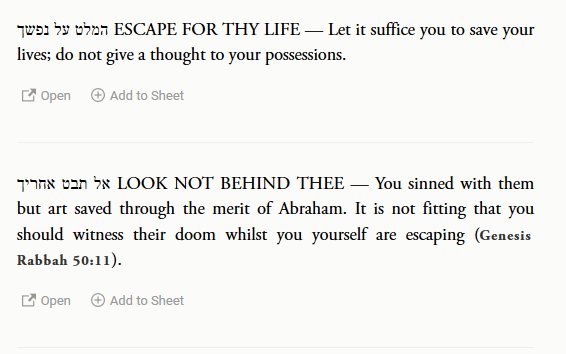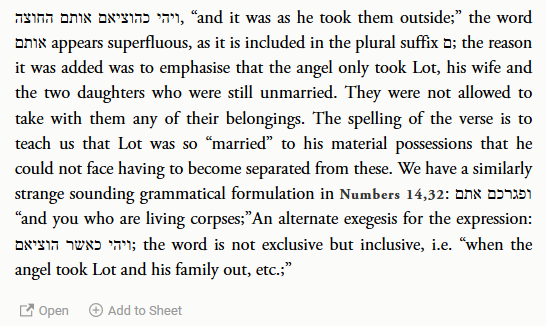Okay, actually I will explicitly refute just one of these, because it's one that I haven't seen before and therefore haven't already explained a million times.
"Murdering a woman for looking over her shoulder"
That's not what happened.
"Murdering a woman for looking over her shoulder"
That's not what happened.
https://twitter.com/fearing_aid/status/1309207680351793152
First off, background that HAS been explained ad nauseum:
The sin of Sodom had nothing to do with homosexuality. It was mistreating the poor and needy, particularly when the means to help them was plentiful. This is explicit in Ezekiel 16:49 and extremely common Jewish exegesis
The sin of Sodom had nothing to do with homosexuality. It was mistreating the poor and needy, particularly when the means to help them was plentiful. This is explicit in Ezekiel 16:49 and extremely common Jewish exegesis

And we're talking *extraordinary* selfishness. There's midrash that a woman was caught feeding a beggar, and her punishment was being covered in honey and placed before a hive of bees. It was her screams as she was being stung to death that caught God's attention.
Lot and his family are not exempt from this sin of selfishness. Genesis 19:17 Rashi explains that Lot is delaying because he cannot give up his possessions, and explicitly states that Lot's family sinned with Sodom but are saved on behalf of Abraham 

Chizkuni elaborates in the same way, commenting on Lot's materialism. He *also* makes clear that "do not look behind you is not literal, it's metaphrical. It's not about what one sees with one's eyes, but what one sees with one's mind's eye. 



So Lot's wife isn't pillarized because she was being punished by a cruel God for literally looking over her shoulder. She was turned to salt because she *rejected God's mercy* - she turned back to Sodom in her mind and her heart, refusing to leave the selfishness and cruelty.
Why salt? Rashi and Chizkuni, again, explain this as relating directly to her own participation in the sin of refusing to share resources and wealth with strangers and the needy. She refused to violate the laws of Sodom by giving salt to her guests. 

In conclusion:
"OT God is cruel and sadistic" is a lie told by people specifically trying to villainize Jews. When we read it, we read a story about how deeply serious God is about the importance of caring for the stranger, the poor and the hungry.
"OT God is cruel and sadistic" is a lie told by people specifically trying to villainize Jews. When we read it, we read a story about how deeply serious God is about the importance of caring for the stranger, the poor and the hungry.
(addendum: reading that last tweet I don't like my own phrasing. I don't think everyone who says these things today is a liar, I think that the initial framing of a cruel God was an intentional lie and at this point it's become zeitgeist and is absorbed unconsciously)
• • •
Missing some Tweet in this thread? You can try to
force a refresh




